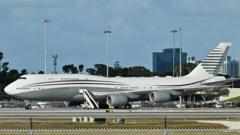A new Boeing 747, gifted by Qatar to the U.S. as part of the Air Force One fleet, faces criticism regarding its legality and potential implications for U.S.-Qatar relations.
Controversy Erupts Over Qatar's Gift of Boeing 747 to Air Force One Fleet

Controversy Erupts Over Qatar's Gift of Boeing 747 to Air Force One Fleet
The U.S. Defense Department has accepted a $400 million Boeing 747 from Qatar, raising eyebrows and concerns across political lines regarding legality and ethics.
The U.S. Defense Department has officially accepted a Boeing 747 from Qatar, intended for inclusion in the Air Force One fleet, a gift that has ignited intense debate and scrutiny. Chief Pentagon spokesman Sean Parnell confirmed that the transfer complies with federal regulations, though the announcement has been met with skepticism from various quarters, including some of President Trump's staunch supporters.
Valued at approximately $400 million, the aircraft is a gift from the Qatari royal family and will require significant modifications to ensure it meets the rigorous security standards required for presidential transport. These enhancements include systems to withstand nuclear electromagnetic pulses and mid-flight refueling capabilities. Experts estimate that retrofitting the airplane could cost upwards of $1 billion.
President Trump has publicly justified the transaction, stating, "They're giving us a gift," and emphasizing that rejecting it would be "stupid." However, the legal ramifications of the transfer are under scrutiny due to the Emoluments Clause of the U.S. Constitution, which restricts public officials from receiving gifts from foreign entities without Congressional approval. Trump argues that as the plane is being given to the defense department rather than directly to him, it is permissible.
The current fleet of Air Force One consists of two Boeing 747-200 jets that have served since 1990, alongside several smaller jets. Due to delays from Boeing on the new 747-8 models, Trump's administration opted for this alternative. In a tweet, Trump sought to dispel allegations of impropriety, labeling the deal as transparent and straightforward.
Qatari Prime Minister Sheikh Mohammed bin Abdulrahman bin Jassim Al-Thani echoed Trump's sentiment, stating that the transfer is purely a government-to-government transaction with no personal interests involved. Yet, the implications of such a substantial gift have raised concerns among policymakers. Notably, Senator Rand Paul expressed worries that it might affect the U.S.'s assessment of Qatar's human rights record, while Senator Ted Cruz warned about potential espionage risks associated with the deal.
Amid the ongoing debates surrounding the Qatar aircraft transfer and its implications for international relations, the discourse reflects broader concerns over ethics and the complex interplay between foreign gifts and national security.





















